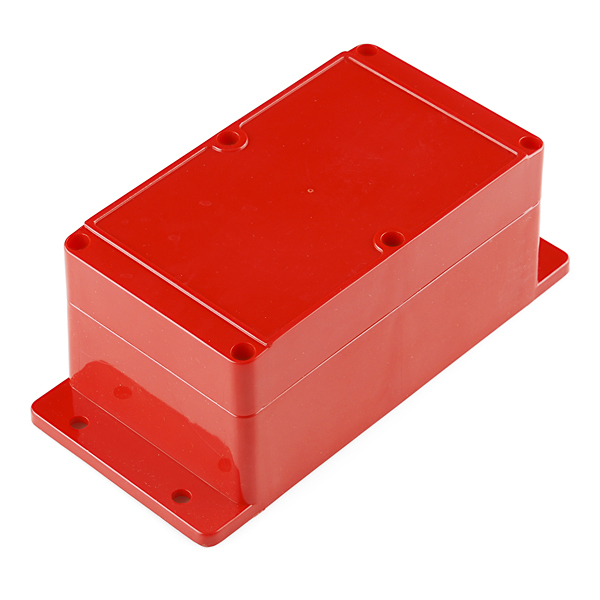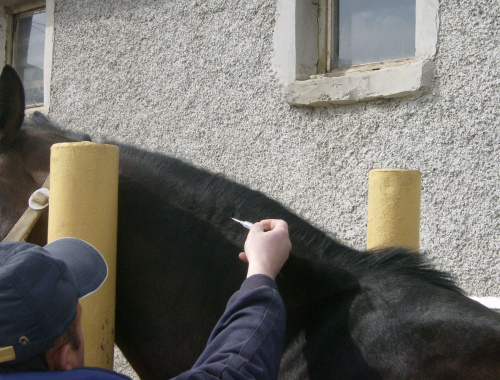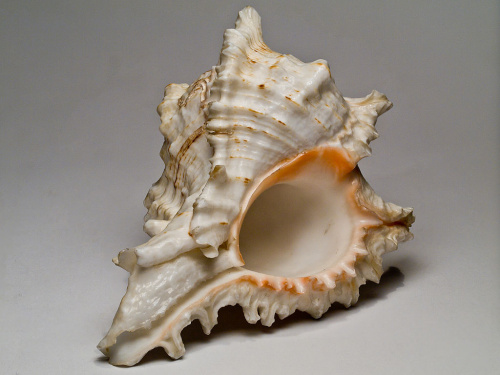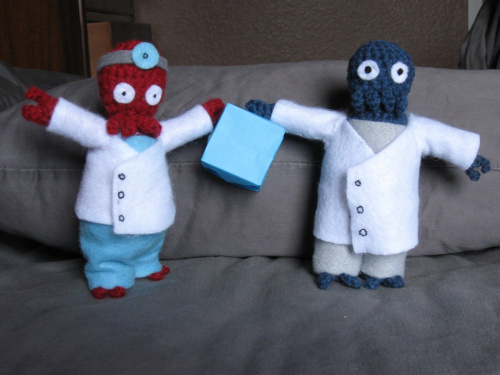Guys, I'm sick of boxes. I'm sorry. I don't want to be unsupportive, and I understand about the practicality of the box. Your board is a rectangle, your box is a rectangle. Maybe your whole project is a rectangle, and you can nest all of these rectangles inside of each other like a cubist matryoshka doll. That's really satisfying, and I don't begrudge you that satisfaction.
But for myself, I want more.
Maybe this stems from my predilection for craft and wearable projects, which are very often mutually exclusive with traditional enclosures.
Not an important part of any outfit, ever.
So let's talk for a moment about other things that are enclosures, which is to say, pretty much everything.
This horse is an enclosure! My dogs are enclosures as well. ("Horse microchiping 3" by Izvora - Own work. Licensed under Public Domain via Wikimedia Commons)
Is it hollow?
If there's room for a critter, there's room for a gadget! (By Uberprutser (Own work) CC BY-SA 3.0, via Wikimedia Commons)
...Can you make it hollow?
Yes you can! ("Chalcosoma atlas m" by JohnSka - Own work. Licensed under CC BY-SA 3.0 via Wikimedia Commons)
Then it's an enclosure!
Is it soft enough to morph around some bits? That's how you get an Orvillecopter!
Maybe you don't want an Orvillecopter.
Why not Zoidberg? (Image by MostlyNerdyCrochet, used with permission)
That's definitely an enclosure!
Obviously a lot of enclosure choice is driven by the project. A box is, at times, the only thing that will work. But especially in the case of projects with remote independent sensors, consider kicking it up a notch. Why have a box on your dryer that sends you a text when your load of laundry is done when you could have an orphaned sock on your dryer that sends a sad text when your load of laundry is done and his compatriot is still MIA?
I leave you with this: Your enclosure is your call, but don't forget the world of bizarre possibilities that awaits you out there. And the first person to leave a "Now that's thinking outside the box!" comment will get a free prize.
The prize will be an eyeroll you can hear from your house.











Mint tins (Altoid - thanks 1oz!), cigar boxes, match boxes - have often served as enclosures. There's enclosures in lots of things you buy as part of groceries (though increasingly less so, as they're reducing plastic use making many too flimsy). SparkFun's red boxes have been used as enclosures (a dedicated SFE parts box was not commercially successful enough to continue, possibly because the default shipping boxes were eating into that in the first place ;) )
But yes, sometimes a dedicated box just works out a lot better. It's just unfortunate that there appears to be no system to these enclosures' sizes except when they target a specific already standardized application (DIN rails, for example, but also eurocard, half eurocard). There's plenty of standards (NEMA, IP)regarding the materials used, how well they keep dust/water/etc. out. But sizes are all over the place, and often there doesn't appear to be any relationship between enclosure X, and enclosure Y which from the manufacturer is the next size up (example: Polycase LP11P: 2.5x2.5x0.9", LP21P: 3.29x2.42x1", LP31P: 4.17x2.8x1", LP41P: 3.29x3.29x1.25"). Sick of Beige also hasn't caught on as of yet.
Back in the 90's there was a local company that sold plastic sheets with a 1cm grid of 90° v-scores. These could then easily be cut into typical box folding layouts, folded, and glued or (with appropriate standoffs) screwed shut. Far from ideal as far as structural integrity goes, but it was probably the least arbitrary system I've seen.
With that lack of standardized sizes, combined with a lack of standardized PCB sizes in the first place (few design for a standard size, let alone stand-off offsets) it's really not surprising that people get creative when it comes to finding enclosures - even if not sharing Dia's "Everything Is An Enclosure"-perception of the world :)
I agree with Kamiquasi that it's not just the box that is the problem. The box, the front/back panels (if applicable) the stand-offs, the components and the PCB size form a system. Nobody has tackled solving the system problem for hobbyists. Well, I took a swing at it (see https://forum.sparkfun.com/viewtopic.php?f=5&t=39492). Standard (free Eagle) PCB sizes, automated front panel alignment, controls and displays that fit, and an enclosure design that's "open source", able to be 3D printed. I'm finishing my second and starting my third project based on the system. Take a look. Sorry Dia, it's still mostly rectangular, but it looks half-way decent and it works. Now if somebody would just mass produce the plastics so they'll be cheaper. Hint, hint.
Would you in a box? Would you with a fox?
SFE already threw the enclosure in for free!
When I was a kid we wore boxes for shoes! Phooey!
Hearing all these comments as if said by Zoidberg I am!
I have an entire box of objects with negative space inside. Or objects in which i can create negative space. The more something blends in to its surroundings, the cooler it is when it actually lights up/moves/yells a line from Young Frankenstein at passers-by. Even an old trophy can be turned into a bluetooth headset.
I started making my own enclosures when I realized that most off-the-shelf project boxes waste a lot of space in the corners. Instead of providing a mount that's strictly sufficient to hold the lid on, most manufacturers have an entire column of unnecessary plastic running from the bottom of the box to the lid. That's space taken that I can't use for anything else which ends up leading to buying a box that's far larger than necessary.
A quick trip to the lumber yard for some 4/4 cherry, a little resaw work, and a planing operation will yield a fair bit of 1/4" material. Take that to the table saw, dimension the sides top & bottom, and spend some time cutting 1/4" box joints on the sides. Glue it together and add supports where you actually need them. If you take the time to put a finish on it, it will really pop - much more so than a bulky off the shelf plastic box. Well - maybe it's just me....
BTW, Sparkfun, a small request. The serlcd product has a lot of board realestate to the left of the display that holds the PIC processor. This ends up dictating the size of an enclosure I needed for a project. Would it be possible to change that product so the PIC is behind the LCD, making the whole display quite a bit larger than the display itself? That was one of the things that led to the above story.
edit: er ... make the serlcd product a smaller device rather than the large size it is now.
I quite like Sick of Beige. They don't fully enclose the board, but they cover enough. Plus, I can laser cut my own on my (edit: eBay special) laser cutter.
http://dangerousprototypes.com/docs/Sick_of_Beige_compatible_cases
Also, I bend up covers to go over my boards on the odd occasion. This was to stop crap from settling on top of the board: http://i.imgur.com/A0e2ydU.png
Actually sock are hermaphrodite. By default they act female but when you prepare a pair for storage, one turns into a male.
nothing with googly eyes looks like it belongs in the washer, so there's that sorted out.
And socks don't have to be female...that's ships. You're thinking of ships.
:-) :-) :-)
Why enclose? I've built analog projects, especially where I needed the solid connection of solder, by not trimming leads and simply connecting stuff together bending wires so they don't touch and hanging the whole thing up with a piece of string. When done for awhile, i squish it gently. When I need to reference, I pull it open. It looks really deep and brainy and as long as it can support it's own weight or hang with many feet of air insulation, it's glorious.
I've been doing that for a while. I call it "Tumbleweed Construction" Many circuit projects started at the screw terminals of the bench power supply, and ended with a scope probe hanging off the end of the bench. Fun times!
Why enclose? To protect the circuit from the cat. To protect the cat from the circuit (some of mine are hundreds of volts). Thermal control, shock and vibe, moisture, wind, etc. To provide mechanical stability and EMI shielding. Your thing may look "brainy", but I bet if you hook up an oscilloscope you'll see ratty signals and even microphonic noise.
Perhaps? It's interesting when the "tumbleweed" circuit version does work, and the carefully translated version on a substrate (perf board, anyone?) DOES NOT! Sometimes the physical relationship of the parts, the branching of heavy current carrying conductors and the natural capacitive and inductive coupling of signals play a big role in circuit operation.
For decades the art (perhaps black-magic) of analog circuit design was all about the construction.
Now that's thinking outside the box!
https://40.media.tumblr.com/9d004993d321eadc8519944f81a2c10f/tumblr_mimzzamM6x1rbuhr4o2_500.jpg
Is the pictured box a SF item?
That's Enclosure - Flanged (Red)